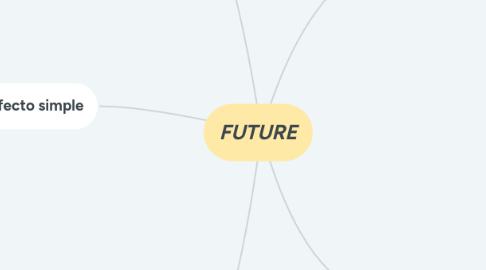
1. future progressive
1.1. USE: The future progressive tense is used for an ongoing action that will occur in the future.
1.1.1. POSITIVE FORM (+) : Subject +will + be + verb (ending in -ing).
1.1.1.1. We will be teaching at the university
1.1.1.2. She will be studying French.
1.1.2. NEGATIVE FORM (-): Subject + will + not + be + verb (ending in -ing).
1.1.2.1. We won’t be teaching at the university
1.1.2.2. She won’t be studying French
1.1.3. QUESTION FORM (?): will + subject + be + verb (ending in -ing).
1.1.3.1. Will we be teaching at the university?
1.1.3.2. Will she be studying French?
2. future perfecto simple
2.1. USE: The future perfect tense is used to describe an action that will have been completed at some point in the future.
2.1.1. POSITIVE FORM (+) : Subject + WILL + HAVE + VERB (third form of the main verb - past participle)
2.1.1.1. He will have returned my car.
2.1.1.2. They will have completed the project.
2.1.2. NEGATIVE FORM (-): Subject + WILL + NOT + HAVE + VERB (third form of the main verb - past participle)
2.1.2.1. He won’t have returned my car
2.1.2.2. They won’t have completed the project
2.1.3. QUESTION FORM (?): WILL + Subject + HAVE + VERB (third form of the main verb - past participle)
2.1.3.1. Will he have returned my car?
2.1.3.2. Will they hace completed the project?
3. future perfect progressive
3.1. USE: The future perfect progressive tense is used for an ongoing action that will be completed at some specified time in the future.
3.1.1. POSITIVE FORM (+): Subject + WILL + HAVE BEEN + Verb-ING
3.1.1.1. I Will have been working in that firm for many years.
3.1.1.2. We will have been loving each other for twenty years
3.1.2. NEGATIVE FORM (-): Subject + WILL NOT + HAVE BEEN + Verb-ING
3.1.2.1. I won’t have been working in that firm for many years
3.1.2.2. We won’t have been loving each other for twenty years
3.1.3. QUESTION FORM (?): WILL + Subject + HAVE BEEN + Verb-ING
3.1.3.1. Will I have working in that firm for many years?
3.1.3.2. Will we have been loving each other for twenty years?
4. wil
4.1. USE: The simple future tense is used for an action that will occur in the future.
4.1.1. POSITIVE FORM (+) : Subject + "will" + main verb.
4.1.1.1. She will watch a film.
4.1.1.2. Mary will work in a restaurant.
4.1.2. NEGATIVE FORM (-): Subject + "will" + "not" + main verb.
4.1.2.1. She won’t watch a film
4.1.2.2. Mary won’t work in a restaurant
4.1.3. QUESTION FORM (?): "Will" + subject + main verb.
4.1.3.1. Will she watch a film?
4.1.3.2. Will Mary work in a restaurant?
5. going to
5.1. USE: • when you have already decided to do sth. in the future • what you think what will happen
5.1.1. POSITIVE FORM (+) : Subject + auxiliary verb ("to be") + "going to" + main verb.
5.1.1.1. He is going to visit her next week
5.1.1.2. She is going to leave for Europe on Monday.
5.1.2. NEGATIVE FORM (-): Subject + auxiliary verb ("to be") + "not" + "going to" + main verb.
5.1.2.1. He isn’t going to visit her next week
5.1.2.2. She isn’t going to leave for Europe on Monday
5.1.3. QUESTION FORM (?): Auxiliary verb ("to be") + subject + "going to" + main verb.
5.1.3.1. Is he going to visit her next week?
5.1.3.2. Is she going to leave for Europe on Monday?
